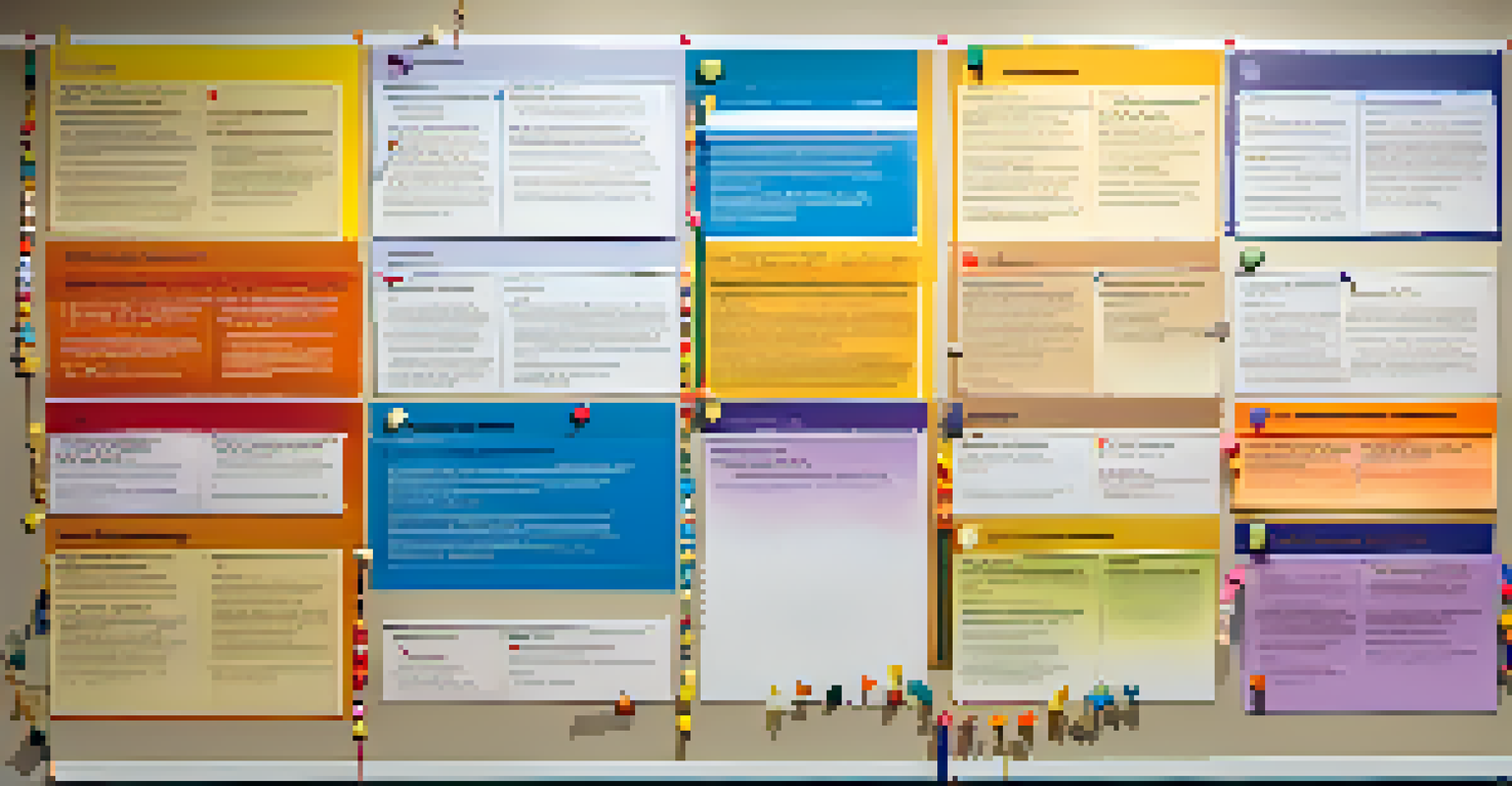Developing a Research Plan for Historical Writing Projects

Understanding the Importance of a Research Plan
A research plan is a crucial blueprint for any historical writing project. It helps you stay organized and focused, ensuring that you cover all necessary aspects of your topic. Without a solid plan, you might find yourself lost in a sea of information, unsure of where to go next.
A good plan violently executed now is better than a perfect plan executed next week.
Think of your research plan as a map for a road trip. Just as you wouldn't set off without knowing your route, you shouldn't dive into historical writing without a clear direction. This plan will guide you through the vast landscape of historical data.
Moreover, a well-structured research plan can enhance the quality of your writing. It allows you to establish a solid foundation, making it easier to weave together narratives that are both engaging and informative.
Defining Your Research Topic Clearly
The first step in your research plan is to define your topic clearly. A well-defined topic narrows your focus and makes your research more manageable. Instead of tackling broad themes like 'World War II,' consider honing in on specific aspects, such as 'The Role of Women in World War II.'

This specific approach not only streamlines your research but also makes your writing more compelling. When you concentrate on a niche, you can delve deeper into the subject matter, uncovering unique insights that may be overlooked in broader studies.
Importance of a Research Plan
A research plan acts as a roadmap, helping you stay organized and focused while enhancing the quality of your historical writing.
Additionally, having a clear topic sets the stage for your entire project. It helps you determine what questions to ask, what sources to seek out, and ultimately, what narrative you want to construct.
Identifying Key Questions to Guide Your Research
Once you have your topic, it's time to formulate key questions that will guide your research. These questions act like signposts, steering you toward relevant information and helping you maintain focus. For instance, if your topic is about women's roles in World War II, you might ask, 'What were the primary contributions of women in factories?'
Research is creating new knowledge.
These guiding questions not only keep your research on track but also stimulate critical thinking. They encourage you to seek out diverse perspectives and challenge existing narratives, enriching your understanding of the topic.
Moreover, having a set of focused questions will make it easier to evaluate the relevance of your sources. If a source doesn't help answer your questions, it may not be worth your time.
Choosing Appropriate Research Methods and Sources
With your questions in hand, the next step is selecting appropriate research methods and sources. Depending on your topic, you might choose to conduct qualitative research, like interviews or oral histories, or quantitative methods, such as analyzing statistical data. Each method has its strengths and can provide different insights.
Consider using a mix of primary and secondary sources to enrich your research. Primary sources, like letters or photographs, offer firsthand accounts, while secondary sources, such as books and articles, provide context and analysis. This combination can create a more nuanced understanding of your topic.
Define Your Research Topic Clearly
Narrowing down your research topic allows for a more manageable and compelling exploration of specific subjects.
Additionally, don't forget to evaluate the credibility of your sources. In historical writing, the reliability of your information is paramount, so always cross-check facts and consider the author's expertise.
Organizing Your Research Efficiently
Once you've gathered your sources, it's essential to organize your research efficiently. A well-organized system saves time and reduces frustration when it's time to write. You might consider using digital tools, such as citation managers or spreadsheets, to keep track of your findings.
Creating categories or themes based on your key questions can also be helpful. By grouping related information together, you can easily access relevant data when drafting your narrative, making the writing process smoother.
Additionally, maintaining a research log can enhance organization. Documenting your discoveries, thoughts, and insights as you go will provide valuable reference points and help you track your progress throughout the project.
Setting a Timeline for Your Research Process
A timeline is an essential part of your research plan. Setting deadlines for each phase of your research will keep you accountable and help manage your workload. Break your project down into manageable chunks, like 'complete initial research' or 'draft outline,' and assign realistic deadlines to each.
Consider using a calendar or project management tool to visualize your timeline. This can help you stay on track and ensure that you allocate enough time for each stage, from research to writing and revisions.
Set a Realistic Research Timeline
Creating a timeline with clear deadlines for each phase of your research keeps you accountable and helps manage your workload effectively.
Moreover, be flexible with your timeline. Sometimes, research takes longer than expected, and that's okay. Allowing some buffer time can reduce stress and give you the freedom to explore new avenues of inquiry.
Reviewing and Adjusting Your Research Plan
As you progress through your research, it's vital to review and adjust your plan as needed. Research can be unpredictable; new insights or unexpected challenges may arise. Regularly assessing your plan allows you to adapt to these changes and stay focused on your objectives.
Consider scheduling periodic check-ins with yourself to evaluate your progress. Ask questions like, 'Am I finding the information I need?' or 'Are my guiding questions still relevant?' This reflection can help you identify areas that need more attention or adjustment.

Ultimately, being open to change can lead to richer, more nuanced writing. Embracing the evolving nature of research will not only enhance your project but also deepen your engagement with the historical narrative.